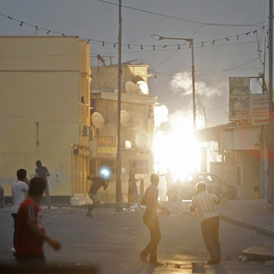Bahrain doctors sentenced to 15 years
Twenty doctors have been jailed for stealing medicine and stockpiling weapons during unrest in Bahrain this year. They have denied the charges.
At a hearing lasting just seven minutes, twenty medical workers were jailed for forcefully occupying a hospital, spreading lies and false news, withholding treatment, inciting hatred of Bahrain’s rulers, and calling for their overthrow.
The accused medical staff say the charges were concocted by the authorities to punish them for treating people who took part in recent anti-government protests.
Thirteen of them, including senior physician Ali Al-Ekri, were given 15-year terms, two were sentenced to 10 years in prison, and the rest to five.
Philip Luther of human rights group Amnesty International said “These are simply ludicrous charges against civilian professionals who were working to save lives amid very trying circumstances. It appears that the real reason for targeting these health workers was the fact that they denounced the government crackdown on protestors in interviews to international media”.
A lawyer for the doctors said that they will appeal the verdict next Sunday.
In a separate ruling, protestor Ali al-Tawil was sentenced to death for running over a policeman and joining illegal gatherings for “terrorist goals”. Another man was handed a life term for his involvement.
In a statement, the British foreign secretary William Hague raised concern at the brevity of the court hearings and said:
“These sentences appear disproportionate to the charges brought. These are worrying developments that could undermine the Baharani Government’s moves towards dialogue and the reform needed for long-term stability in Bahrain.” He went on to call for such cases to be transferred to civilian courts in order to allow an appeal process.
Potential amnesty
Meanwhile, a military court upheld life sentences handed down in June to opposition leaders for organising the protests.
The eight include rights activist Abdulhadi al-Khawaja and opposition leaders, among them Hassan Mushaimaa, who campaigned to turn Bahrain into a republic.
Everything is open for discussion – except regime change. Bahrain Information Affairs Authority spokesman
They could still potentially be released via an amnesty from King Hamad bin Isa al-Khalifa.
The eight were among 21 men in total at the hearing. Those who avoided life sentences included the leader of the secular Waad party, Ibrahim Sharif, a Sunni Muslim whose five-year sentence also was upheld, and blogger Ali Abdulemam, sentenced to 15 years in absentia and thought to be in hiding inside Bahrain.

The 21 were found guilty of charges including “forming a terrorist group to change the constitution and its monarchical system”, collecting and donating money for these activities, inciting sectarian hatred, organising unlicensed protests, and collaborating with a foreign country – a reference to Iran.
In March, Bahrain‘s Sunni rulers, with the aid of fellow Sunni neighbours Saudi Arabia and the United Arab Emirates, cracked down on protests led by the Shi’ite majority, who were demanding a greater say in government.
At least 30 people were killed, hundreds wounded and more than 1,000 detained in the crackdown.
The Bahrain Society for Human Rights issued a statement expressing deep concern at the “harsh” sentences.
Reforms ‘will not stop’
The various criminal cases come as the Gulf kingdom’s government says it is prepared to hold more talks with the Shi’ite opposition on political reforms amid a fresh wave of protests in the capital Manama.
Sheikh Abdul-Aziz bin Mubarak al-Khalifa, a senior adviser at the Information Affairs Authority, said that “everything is open for discussion – except regime change. That doesn’t mean it has to be discussed today (but) the king said reforms are not going to stop.”
“Other issues can be brought to the table – when and how, I’m not sure.”
Last weekend, more arrests and clashes between authorities and protesters came amid polling for a parliamentary election.
The election was to fill 18 seats vacated by al-Wefaq, Bahrain’s largest opposition party, which withdrew from parliament in protest at the treatment of demonstrators during the unrest.
